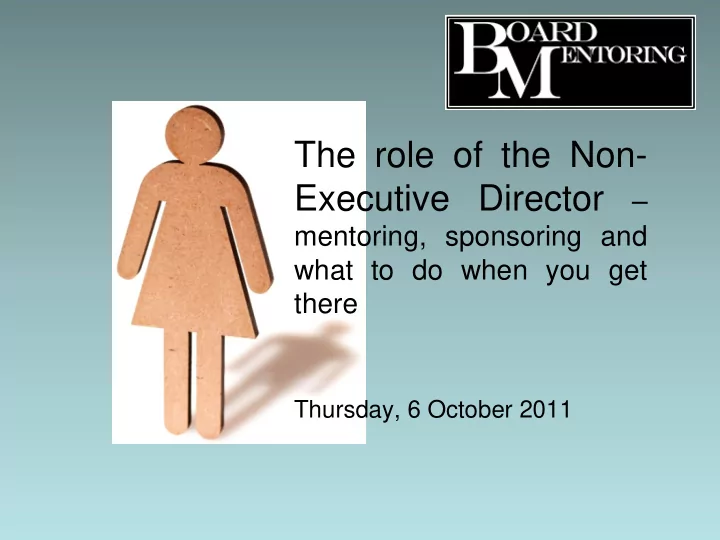

The role of the Non- Executive Director – mentoring, sponsoring and what to do when you get there Thursday, 6 October 2011
The role of the NED I As part of their role as members of a unitary board, non- executive directors should constructively challenge and help develop proposals on strategy. UK Corporate Governance Code, Main Principle A.4
The role of the NED II • Constructively challenge • Help to develop strategy • Scrutinise performance of management • Monitor reporting of performance • Be satisfied as to integrity of financial information UK Corporate Governance Code
The role of the NED III • Be satisfied financial controls and systems of risk management are robust and defensible • Determine appropriate levels of remuneration of executive directors • Have a prime role in appointing and removing executive directors • Have a prime role in succession planning • Develop an understanding of the views of major shareholders UK Corporate Governance Code
The FSA’s focus on NEDs “Our ARROW visits now focus more on firms’ governance mechanisms and the role played by directors, especially NEDs.” FSA Policy Statement 10/15: Effective Corporate Governance (September 2010)
FSA’s key competencies for a NED • Market knowledge • Understanding of business strategy and business model • Risk management and control • Financial analysis and control • Governance, oversight and control • Regulatory framework and requirements
Is the FSA interested in diversity? “While the FSA does not have a specific equality and diversity objective or have targets for the number of women or other groups being authorised to carry out SIF roles, we are permitted under the public sector equality duty to monitor which groups are represented among those individuals we approve and to act as advocates for equality and diversity generally within the firms that we regulate.” FSA Policy Statement 10/15: Effective Corporate Governance (September 2010)
The risk of a lack of diversity • “Our focus on individuals’ experience and qualifications could increase the conformity and homogeneity of those at the top of the UK financial services industry, with the risk that levels of challenge and alternative points of view are reduced….” • “…We have been asked to focus not only on the attributes of each individual director, but also on the overall composition of the governing body in relation to the firm itself.” FSA Policy Statement 10/15: Effective Corporate Governance (September 2010)
Why the FSA might be interested in diversity “Having a more diverse board may help deliver better regulatory outcomes, as increased diversity produces a wider range of perspectives, thought and approaches to solving regulatory problems and can help avoid the danger of ‘group think’.” FSA response to Commission Green Paper: Corporate Governance in Financial Institutions and Remuneration Policies, 31 August 2010
But no to quotas ... “We would have concerns about the introduction of a fixed quota, which we think could raise the risk that people are appointed just to fulfil the quota, rather than because they have the right qualities needed by that Board at that time.” FSA response to Commission Green Paper: Corporate Governance in Financial Institutions and Remuneration Policies, 31 August 2010
Mentoring and Sponsorship • Gillian Wilmot – founder BoardMentoring.com and currently an NED at Pockit.com and chair in the public sector • Anne Boden – former chair, Royal Bank of Scotland EMEA board for Global Transaction Services; currently member, Board of Governors, Middlesex University • Katherine Innes Ker – senior independent director at Tribal Group plc, NED at St Modwen Properties and The Go-Ahead Group • Margaret Young – chairman at Cattles and Welcome Financial Services (formerly executive chairman for two year period of operational and financial restructuring); previously SID at Unigate and supervisory board member at Royal Numico NV
Background I • Companies serve their customers and stakeholders best when the leadership team is diverse and there is diversity of thinking • Diversity has been shown to reduce the risk of “group think” and improve performance • Financial services - where risk management is critical - is particularly short of women in senior leadership roles
Background II • The emphasis on very specific sector experience is a real challenge to improving diversity • Women are a minority in the boardroom across UK corporate life and this lack of diversity goes beyond gender • Evidence shows that sponsorship is important and, anecdotally, women are less likely to be sponsored by a senior leader
Mentoring I • Mentoring is the transfer of skill and knowledge from a highly experienced leader who has faced similar challenges • Mentees can learn from this experience whilst receiving trusted, confidential advice on how to meet their challenges and achieve their objectives • Each framework is specific to the mentee but it will include setting expectations and objectives and a defined timeframe
Mentoring II • The mentor needs to understand the organisation's perspective as well as the mentee's, but all discussions are kept confidential • An internal mentor has the advantage of greater organisational knowledge and can also sponsor their mentee, but often they struggle to devote the necessary time and they lack independence • Internal mentors really benefit from master classes in how to mentor effectively
Sponsorship • Sponsorship has been shown to be key to progression within an organisation • People have a natural tendency to recruit and sponsor in their own image • Internal mentors can act as sponsors for their mentees and this is a valuable role • Creating internal mentoring programmes can promote sponsorship for a more diverse group
The role of the Non- Executive Director – mentoring, sponsoring and what to do when you get there Thursday, 6 October 2011
Recommend
More recommend